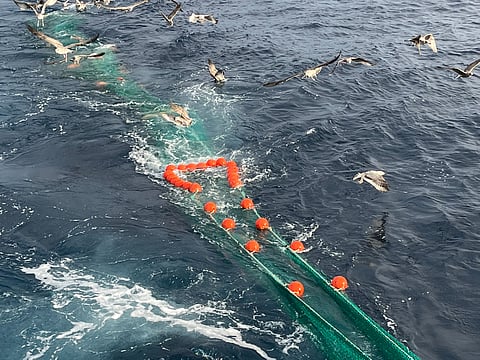

Selective trawl net equipped with a dolphin exclusion device.
Xulio Valeiras, IEO-CSIC
The Spanish Institute of Oceanography (IEO, CSIC) in Spain has launched a new oceanographic campaign aimed at reducing fishery discards and accidental bycatches.
Scientific and technical staff will be working in the Cantabrian National Fishing Ground until September 17 aboard the Miguel Oliver oceanographic vessel, operated by the Spanish Ministry of Agriculture, Fisheries and Food.
The ESCARSEL 0925 campaign will include analyses of the selectivity, behavior, and survival of discarded species, the mitigation of accidental cetacean bycatch, and the impact of fishing on the seabed.
The campaign will also study the idiosyncrasies of trawling activity and the impact of nets on the seabed, as well as the behavior of target species inside fishing nets using underwater cameras.
Finally, two cetacean exclusion devices will be tested. These devices are specifically designed to release dolphins and elasmobranchs (sharks and rays) from the nets, preventing mortality from accidental bycatch. The survival of these species will also be investigated to improve knowledge of their biology.
"We aim to gather technical data in the Cantabrian-Northwest National Fishing Ground that will provide scientific evidence to improve fishing gear and strategies towards more environmentally friendly and sustainable fisheries," said Xulio Valeiras, researcher at the Oceanographic Center of Vigo (Galicia) and head of the campaign.
This campaign has been co-funded by the European Union through the European Maritime, Fisheries and Aquaculture Fund (EMFAF) as part of the National Programme for the collection, management, and use of data in the fisheries sector and support for scientific advice in relation to the Common Fisheries Policy.
